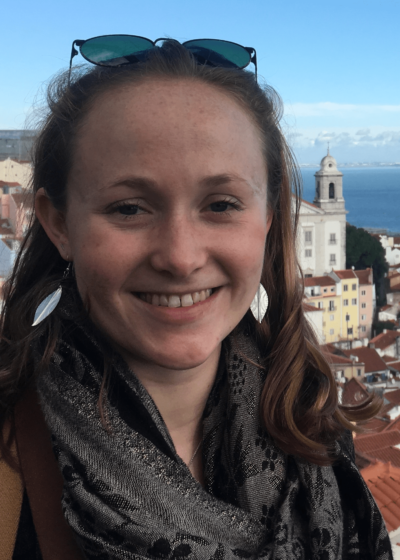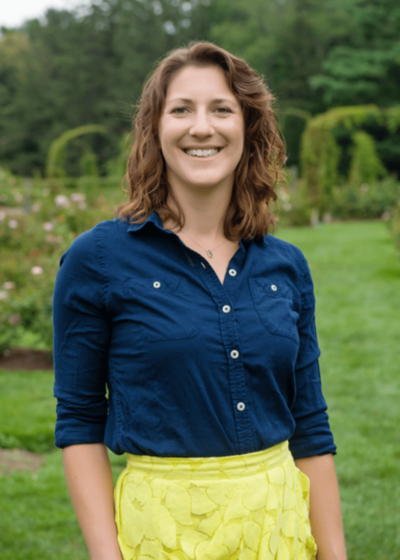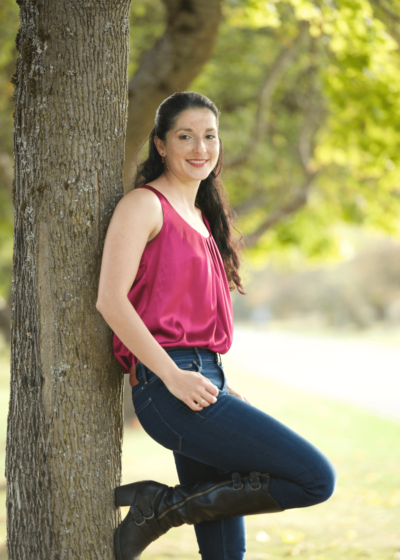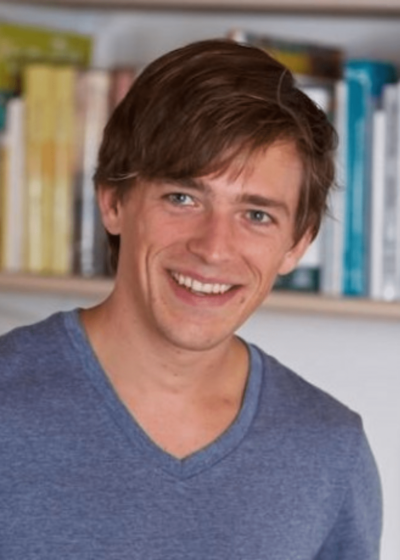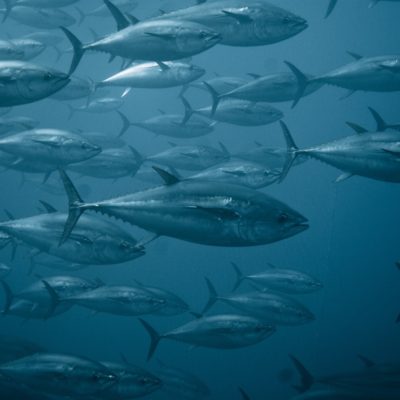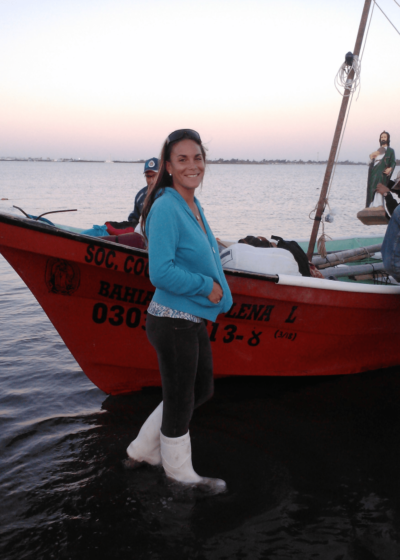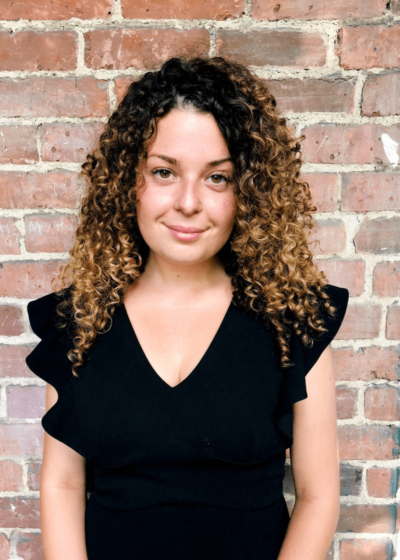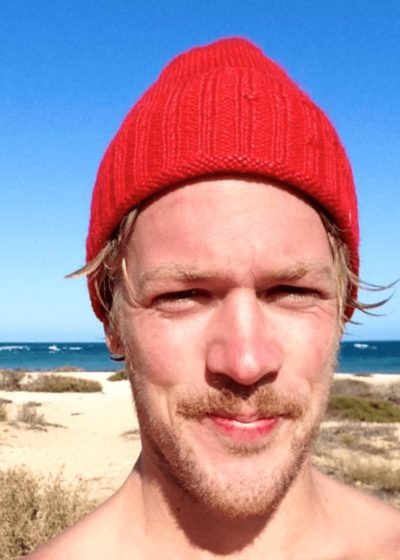People
Harriet Harden-Davies
Ph.D.
2017-2019 University of Wollongong
Nexus Research Fellow, ANCORS (University of Wollongong)
Harriet Harden-Davies was a research fellow with the Nereus Program at the University of Wollongong, Australia. Her research sits at the interface of ocean science, law and policy. Her work has a particular focus on the role of science and technology transfer in the conservation and sustainable use of marine biodiversity in areas beyond national jurisdiction. She is a member of several international working groups, including the UNESCO-IOC Group of Experts on Capacity Development and the Deep Ocean Stewardship Initiative. Harriet has previously held senior management and science-policy research roles at the Australian Academy of Technological Sciences and Engineering and the UK Royal Society.
View More
Zoë Kitchel
Ph.D. Student
2019-2020 Nereus Fellow, Rutgers University
Ph.D. Candidate (Rutgers University)
Zoë is working towards her PhD in the Ecology and Evolution Department at Rutgers University. After graduating from Yale College in 2015, she spent two years working in fisheries curriculum development at the University of Alaska Southeast. Now working with Dr. Malin Pinsky, Zoë is exploring the dynamics at play at range boundaries of commercial fish species, and especially how species’ traits act as a filter for environmental variability. In addition, she is a part of Rutgers’ Coastal Climate Risk and Resiliency Traineeship, aiming to bridge the gap between biologists, engineers, social scientists, and policy makers all interested in resiliency within coastal communities. She hopes for her research to push the boundaries of science, but to also be accessible to communities experiencing change first hand.
View More
Andre Boustany
Ph.D., Zoology
2011-2013 Senior Research Fellow (Duke University)
Research Scientist, Monterey Bay Aquarium
Andre Boustany is a research scientist at Duke University where he studies pelagic fish and fisheries with a focus on reducing bycatch and improving fishing efficiency. In addition to his research, Boustany also teaches classes in marine conservation and fisheries ecology and serves as a member of the Atlantic Highly Migratory Species Advisory Panel and the US ICCAT Advisory Committee, advising NOAA on domestic and international management of pelagic fishes in the Atlantic Ocean.
View More
Thomas Frölicher
Ph.D., Climate & Environmental Physics
2012-2013, 2014-2015 Senior Research Fellow (Princeton University)
Assistant Professor, University of Bern
Thomas Frölicher’s research involves consideration of models, theory, and observations. He is interested in the present and future climate and carbon cycle interaction from a regional to global scale. His research focuses on the ocean components of the Earth System and its role in nutrient and carbon cycling and ultimately climate. He is also interested in exploring the responses of ecosystems and fisheries production to past and future climate variability and change. Frölicher was a senior scientist at ETH Zurich and is now working as an Assistant Professor at the University of Bern.
View More
Wilf Swartz
Ph.D, Fisheries Economics
Program Manager
2012-2014 Senior Research Fellow (University of British Columbia)
Research Associate, Marine Affairs Program (Dalhousie University)
Wilf Swartz is a program manager of Nereus program. While most of his past work focused on examining global seafood consumption in the context of fleet expansion and international governance of fisheries subsidies, Wilf Swartz now focuses primarily on seafood supply chain management. Specifically, his current research interests include corporate social responsibility (CSR) policies in the seafood industry, sustainability standards in aquaculture, and modelling of price-setting mechanisms under perishability constraints (e.g. the fresh fish market in Japan).
View More
Natasha Henschke
Ph.D., Biological Oceanography
2015-2016 Princeton University
Post-Doctoral Research Fellow, Oceanography (University of British Columbia)
Natasha Henschke’s background is in biological oceanography, with her research focusing on how gelatinous zooplankton communities respond to changing oceanographic conditions. There is concern that as a result of anthropogenic factors our oceans are shifting from a fish-based to a jellyfish-based ecosystem, however recent reviews have failed to reach a consensus on whether gelatinous zooplankton abundances have been increasing worldwide. In her current work at Nereus she aims to investigate this issue by using earth system models developed at the NOAA Geophysical Fluid Dynamics Laboratory to examine the distribution and abundance of future gelatinous zooplankton populations under different climate and fishing scenarios.
View MoreColleen Petrik
Ph.D., Biological Oceanography
2015-2017 Research Fellow (Princeton University)
Assistant Professor, Scripps Institution of Oceanography (University of California San Diego)
Colleen Petrik’s background is in biological oceanography and ecology, quantitatively rooted in mathematics and physics. Petrik’s research focuses on understanding how the physical environment mediates the ecology of zooplankton and commercially harvested fish and invertebrate species and the implications of climate variability and climate change on these relationships. With the Nereus Project, Petrik studied the effects of behavior and composition of crustacean zooplankton, the addition of fish early life stages, and dynamic coupling between zooplankton and fishes on the future state of global fisheries. She is now an assistant professor at the Scripps Institution of Oceanography at UC San Diego.
View MoreRichard Caddell
Ph.D., International Law
2014-2017 Research Fellow (Utrecht University)
Senior Lecturer, Law (Cardiff University)
Richard Caddell specializes in the Law of the Sea and International Environmental Law, with particular expertise in wildlife management, the conservation of marine biodiversity and Polar law. He has an active interest in the regulation of whaling and marine mammal conservation, fisheries and Arctic issues, as well as human rights concerns. Caddell has advised numerous intergovernmental organizations, national governments and nongovernmental organizations on aspects of international and EU environmental law, the coordination of environmental treaties and the management of the Arctic region.
View MoreAudrey Valls
Ph.D., Zoology
2011-2014 Junior Research Fellow (University of British Columbia)
Audrey Valls’s doctoral research explored methods for understanding, modeling and predicting feeding relationships between marine species. She proposed a novel index, using a mathematical model to represent food webs and identify ecologically important species. She also looked at how to use knowledge in fish feeding behavior to predict fish diet composition. Her research highlighted the usefulness of digital and open-access information repositories in marine ecology and fisheries science. Audrey is now working on coupled human-nature systems models at the Centre for Biodiversity Theory and Modelling.
View MoreJames Watson
Ph.D., Marine Sciences
2012-2013 Senior Research Fellow (Princeton University)
Assistant Professor, College of Earth, Oceans and Atmospheric Science (OSU)
James Watson’s research aims to improve governance of marine systems and mitigate the impact of these disturbances. His work focuses on understanding crucial feedbacks between physical, ecological and social processes.
View MoreKelly Kearney
Ph.D., Geosciences
2011-2014 Junior Research Fellow (Princeton University)
Research Scientist, University of Washington-Joint Institute for the Study of the Atmosphere and Ocean (JISAO)/ NOAA NMFS Alaska Fisheries Science Center
Kelly Kearney is a marine scientist whose research focuses on marine (and occasionally coastal) ecosystem dynamics. Specifically, Kearney’s research is focused on developing modeling techniques that bridge the gap between traditional lower trophic level biogeochemical models and upper trophic level fisheries and ecosystem models.
View MoreMarc Metian
Ph.D., Oceanography & Marine Environment
2011-2013 Senior Research Fellow (Stockholm University)
Research Scientist, International Atomic Energy Agency
Marc Metian has a keen interest in aquaculture globally and future challenges associated with its development, particularly the debate about “competition between feed and food resources”. More specifically, he is looking at links between sustainable use of resources, food security and governance, particularly in light of projected substantial increased demand for seafood due to both population growth and per capita consumption.
View MoreMiranda Jones
Ph.D., Fisheries
2013-2014 Senior Research Fellow (UNEP-WCMC)
Biology Teacher, Westminster School
Miranda Jones’s main research explores the impact of climate change on marine fish and invertebrates, applying species distribution models to project species’ range shifts and evaluating their uses and sensitivities within an ensemble model approach. She is also interested in species’ vulnerabilities to climate change, as well as the socio-economic implications of shifts in species’ distributions, using interdisciplinary approaches to assess changes in fishery productivity and profitability.
View MoreAndrew Merrie
Ph.D., Sustainability Science
2011-2016 Junior Research Fellow (Stockholm University)
Research Liason Officer, Stockholm Resilience Centre
Andrew completed his Ph.D. thesis titled Global Ocean Futures – Governance of marine fisheries in the Anthropocene. The thesis provides an analysis of how an adaptive governance approach can be applied to address existing and emerging challenges in global governance with a focus on marine, wild-capture fisheries. Andrew is now working on science communications and science-policy work at the Stockholm Resilience Centre. His work is in support of the Guidance For Resilience in the Anthropocene – Investments for Development program.
View MoreGabriel Reygondeau
Ph.D., Macroecology & Oceanography
2015-2018 Research Fellow (University of British Columbia)
Research Associate, Changing Ocean Research Unit (University of British Columbia)
Gabriel Reygondeau’s research focuses on the thematic of “The effects of climate changes and anthropogenic activities on the biogeography of the global ocean”. His current research interests can be summarized in 3 topics: (1) relations between marine organisms (from plankton to top predator), biodiversity and environmental conditions at the global scale; (2) Identification and monitoring of global marine ecosystems and (3) Evaluation of the impact of anthropogenic pressures on the global marine ecosystems.
View MoreLaurens Geffert
Ph.D., Geography
2011-2016 Junior Research Fellow (University of Cambridge/WCMC)
Director, Nielsen, Identity Data Scientist
Laurens Geffert conducted his PhD research at the University of Cambridge in cooperation with UNEP-WCMC. Before his PhD he studied Biology, Geography, Ecology and Conservation at the University of Bonn, Germany. His PhD research focused on “Improving range map methodologies for marine taxa”. He tested approaches to account for sampling bias in species occurrence records and developed a method to integrate spatially explicit expert knowledge into quantitative machine learning models to more accurately map commercially important marine fish species. Laurens now works as a Data Scientist and uses psychometric data to better understand human behavior.
View MoreLisa Dellmuth
Ph.D., Political Science
2014-2016 Senior Research Fellow (Stockholm University)
Associate Professor, Department of Economic History and International Relations (Stockholm University)
Lisa Dellmuth (F) is a tenured Senior Lecturer in International Relations at Stockholm University. Her research interests include global environmental politics and the legitimacy and effectiveness of international governmental organizations such as the United Nations and its bodies and agencies. Lisa has received several awards for her research and has been a principal and co-investigator for several external grants, funded by donors such as the EU and the Swedish Research Council. Her research is published in leading international journals such as the British Journal of Political Science, Review of International Organizations, and European Union Politics.
View MoreMaria de Oca
Masters, Marine Biodiversity & Conservation
2014-2017 Research Fellow (Duke University)
Maria de Oca is a James B. Duke Fellow working on her PhD at Duke University. At the Marine Geospatial Ecology Lab she is studying the bottom-up regulation of fisheries production.
View MoreMathieu Colléter
Ph.D., Zoology
2015-2016 Junior Research Fellow (University of British Columbia)
Nexus Research Fellow (Institute National Polytechnique)
Mathieu Colléter is a fisheries scientist whose research focuses on ecosystem modelling and trophic networks. He is currently a Master’s candidate in Advanced Global Studies, specialized in Environmental Policy, at the Parisian School of International Affairs (SciencesPo Paris). At Nereus, he worked on the production of biomass estimates for the 180,000 ½ degree Sea Around Us cells covering all oceans, from 1950 to 2010, using ecosystem modelling (EcoTroph) and the Sea Around Us’ new spatialized catches. This will be used to model future changes in global biomass and fisheries catch under climate change scenarios.
View MorePhil Underwood
Ph.D., Theoretical Ecology
University of Cambridge/WCMC
2014-2018 Research Fellow (University of Cambridge/WCMC)
Senior Modeller, ADAS
Phil Underwood works with the Madingley model to validate its use as a policy informing tool in relation to fisheries and food security. As a member of the Nereus Program, Underwood will be working to better understand the relationship between oceanic ecosystems and human societies. To this end he will improve the ecological realism of the Madingley Model in order to generate future projections of fisheries in a global context.
View MoreRebecca Asch
Ph.D., Biological Oceanography
2013-2016 Senior Research Fellow (Princeton University)
Assistant Professor of Fisheries Biology, East Carolina University
Rebecca Asch is a fisheries oceanographer whose research focuses on interactions between fisheries, plankton ecology, and climate. Her research combines fieldwork, time series analysis, and ecosystem modeling, spanning local-to-global and subseasonal-to-centennial scales. Rebecca’s research primarily investigates whether climate change could lead to increased seasonal mismatches between trophic levels. Many fishes spawn synchronously with plankton blooms to maximize food availability for their offspring. Seasonal timing of both fish reproduction and plankton blooms is changing under global warming, but these shifts do not always occur at the same rate. Mismatches between trophic levels can lead to lower recruitment and decreased fisheries productivity.
View MoreAndrés Cisneros-Montemayor
Ph.D., Fisheries Economics
Program Manager/Research Associate
2014-2016 Senior Research Fellow (University of British Columbia)
Assistant Professor (Simon Fraser University)
Andrés Cisneros-Montemayor is a resource economist specializing in applied fisheries management and ecosystem services. His research touches on optimal economic policies, co-management, transboundary fisheries, ecotourism, and small-scale and Indigenous fisheries, always with a view to achieving sustainable resource use in a changing world.
View MoreDaniel Dunn
Ph.D., Marine Science & Conservation
University of Queensland
2011-2014 Junior Research Fellow (Duke University)
2014-2017 Senior Research Fellow (Duke University)
Senior Lecturer, School of Earth and Environmental Sciences (University of Queensland)
Research Scientist, Director CBCS
Daniel Dunn is a research scientist with the Marine Geospatial Ecology Lab at Duke University where he focuses on the conservation of marine biodiversity in areas beyond national jurisdiction, and dynamic management of marine resources. This work is driven by an interest in conservation biology grounded in pelagic ecology, biogeography and macroecology. To more directly address these issues at appropriate scales and over their full extent, Dunn works to bring science to bear on marine policy in areas beyond national jurisdiction.
View MoreRyan Rykaczewski
Ph.D., Biological Oceanography
2011-2012 Senior Research Fellow (Princeton University)
Supervisory Marine Scientist, NOAA Fisheries, Hawaii
Assistant Professor, University of South Carolina
Ryan Rykaczewski, assistant professor at the University of South Carolina’s Marine Science Program and Biological Sciences program, focuses his research on the responses of ecosystem and fisheries production to past and future climate variability and climate change. This research involves consideration of theory, observations, and models. He holds a PhD from the Scripps Institution of Oceanography at the University of California, San Diego.
View MoreChris McOwen
Ph.D., Marine Biology
2011-2014 Senior Research Fellow
Lead Conservation Scientist, UNEP-WCMC
Nexus Principal Investigator
Chris McOwen is a postdoctoral scientist working with the Marine team together with staff in the Department of Geography, University of Cambridge. He researchers a variety of aspects relating to marine capture fisheries. Specifically, Chris is exploring the drivers of fisheries production, considering a range of ecological, oceanographic and socioeconomic processes, so that future fisheries production can be predicted and marine ecosystems exploited sustainably.
View MoreFernando Gonzalez Taboada
Ph.D.
2018-2020 Princeton University
Associate Research Scholar, Atmospheric and Oceanic Sciences Program
(Princeton University)
I am a biological oceanographer with a strong focus on the analysis of global change impacts using satellite oceanography and Bayesian analysis. My main interest lies at the study of physical-biological coupling on planktonic systems and how these effects propagate up through marine food webs. I rely primarily on statistical and mechanistic modeling of satellite and population data to pursue these topics, combining techniques from spatial statistics, time series modeling and population ecology.
View MoreJoey Bernhardt
Ph.D., Zoology
2018-2020 Post-doctoral fellow, McGill University
Post-Doctoral Fellow, Biology (McGill University)
Joey’s research seeks to understand how populations and communities adapt and persist in changing environments. She integrates across levels of biological organization to quantify how flows of energy and materials at the level of the individual cascade up to shape populations over environmental gradients. By combing theory, experiments and synthesis, she aims to understand the metabolic underpinnings of biodiversity and the connections between biodiversity and human well-being. Her work unifies perspectives on energy flow with population and community ecology to advance a more coherent and mechanistic science of global change.
View MoreKisei Tanaka
Ph.D., Ecology and Environmental Studies
2017-2019 Princeton University
Research Marine Biologist, NOAA Fisheries, Hawaii
Through multidisciplinary collaboration with government agencies and universities, Kisei focuses on modeling and quantitative methods that can facilitate adaptive ecosystem-based management framework in commercial fisheries under climate change. Kisei’s broad scholastic interests include fisheries ecology, population dynamics, and fisheries stock assessments and management. He is also interested in evaluating environmental impacts on spatiotemporal changes in fish distribution, analyzing the effectiveness of fisheries-monitoring programs, and studying coupled natural and human systems in fisheries.
View MoreSolène Guggisberg
Ph.D., International Law
2017-2020 Utrecht University
Post-Doctoral Research Fellow (Utrecht University)
Solène Guggisberg specializes in the law of the sea, environmental law, and international dispute settlement. Her current research interests lie in fisheries governance, climate change, and sustainable development. She previously worked for United Nations bodies as well as international governmental and nongovernmental organizations involved in fisheries and maritime affairs providing legal advice and opinions on international and EU fisheries law, maritime delimitation, and sustainable development issues.
View MoreKaty Seto
Ph.D., Environmental Science, Policy, and Management
2017-2019 University of Wollongong
Assistant Professor (University of California Santa Cruz)
Katy Seto’s research centers on coupled human and natural systems dynamics in marine and coastal systems. Her primary areas of focus are 1) the contribution of marine resources to food and livelihood security, 2) governing marine and coastal systems for resource equity and sustainability, and 2) maritime security and globalization in a context of rapid global change. Her work investigates the equity, sustainability, and governance of marine and coastal systems, and the reciprocal relationship they have with human wellbeing and conflict.
View MoreElena Finkbeiner
Ph.D., Biology
2016-2018 Center for Oceans, Conservation International
Fisheries Science Program Manager, Conservation International Centre for Oceans
Elena Finkbeiner’s research is on how we can increase both social well-being and ecological sustainability in the face of increasing uncertainties and threats that global fisheries face. She uses small-scale fisheries as her study system, given their importance for global livelihood and food security, culture, and ecological sustainability. Elena draws from ecology, political science, anthropology, and economics, and uses a mix of qualitative and quantitative methods, including ethnographic techniques, analysis of fisheries catch data, and behavioral economic experiments.
View MoreJulia Mason
Ph.D., Biology
2018-2019 Stanford University
Post-Doctoral Fellow, Atkinson Centre for Sustainability (Cornell University)
Julia Mason is a recent Ph.D. graduate from Stanford University’s Hopkins Marine Station. Her research is on the effects of climate variability and management on the social-ecological resilience of fisheries in California and Peru. She is interested in dynamic management approaches that protect highly migratory species and fisheries livelihoods in a variable, changing climate. Julia is currently a John A. Knauss fellow for Massachusetts Senator Ed Markey’s office for 2019.
View MoreTiff-Annie Kenny
Ph.D., Biology
2016-2019 University of Ottawa
Adjunct Professor (Laval University)
Tiff-Annie is interested in human dependency on biodiversity for nutrition and food security. Her research employs participatory and systems-based methodologies to examine the links between marine environments and human health, with a particular focus on the ecological, environmental, and economic dimensions of Indigenous Peoples food systems. Tiff-Annie holds a B.Eng. and an MSc. (Applied) in Biosystems Engineering from McGill University, and a PhD in Biology from the University of Ottawa.
View MoreOai Li Chen
Ph.D., Aquaculture and Fisheries Economics
2017-2019 University of British Columbia
Oai Li Chen’s research focuses on drivers of change in the seafood markets and their implications for fisheries sustainability and the well being of fish producers and consumers, at the national and global levels. She is developing an integrated assessment model that links economic and biophysical components to explore co-benefits and trade-offs in global marine biodiversity, food provisioning and economic benefits under different development pathways for the future oceans.
View MoreBecca Selden
Ph.D., Ecology, Evolution and Marine Biology
2017-2019 Rutgers University
Assistant Professor, Biological Sciences (Wellesley College)
Becca Selden is a broadly trained marine ecologist interested in examining how climate change is impacting marine communities and the fishers that depend on them. She is currently working as a NSF OCE Post-doctoral Research Fellow at Rutgers University investigating how climate change is impacting marine predator prey interactions. For Nereus, she will examine how shifting species distributions are creating no-analog communities within coastal marine systems, and how such changes in ecological community structure might also impact fishing communities.
View MoreRobert Blasiak
Ph.D., International Cooperation
2017-2019 Stockholm University
Researcher (Stockholm University)
Robert Blasiak is a post-doctoral researcher at the Stockholm Resilience Centre and a visiting researcher at the University of Tokyo. He holds a Ph.D. from the University of Tokyo, where he focused on how conflict and cooperation among states can impact the conservation and sustainable use of ocean resources. His current research focuses not only on how states can promote sustainable ocean management, but also the crucial role that can be played by transnational corporations, intergovernmental bodies and non-governmental organizations.
View MoreTyler Eddy
Ph.D., Marine Biology
2016-2019 (University of British Columbia)
Associate Research Professor, Fisheries and Marine Institute (Memorial University)
I am interested in the impacts of coastal resource use on marine ecosystems in the past, present, and future. I have participated in field expeditions to the Juan Fernández Archipelago, Chile, the Kermadec Islands, New Zealand, the Galápagos Islands, Ecuador, and throughout Atlantic Canada observing subtidal communities. I employ a range of ecological and statistical modelling techniques to understand relationships between fishing, climate change, and marine ecosystems. My work contributes to the fields of marine ecology, fisheries science and management, marine conservation, historical ecology, and climate change. I am a visiting scientist at Dalhousie University, Canada, the Charles Darwin Foundation, Galápagos, Ecuador, and the Changing Ocean Research Unit at the University of British Columbia, Canada and the regional coordinator for FISH-MIP, based at the Potsdam Institute for Climate Impact Research (PIK), Germany.
View MoreGerald Singh
Ph.D., Resource Management and Environmental Studies
2016-2019 University of British Columbia
Assistant Professor (University of Victoria)
Gerald Singh is a Nereus Fellow working with Yoshitaka Ota and Andres Cisneros-Montemayor and collaborating with the United Nations Development Programme. Gerald is characterizing the contribution of a sustainable ocean to achieving broad sustainable development goals. Using the United Nations Sustainable Development Goals (SDGs) as a framework, Gerald is researching how the SDGs are dependent on achieving sustainable use and management of the ocean.
View MoreRachel Seary
Ph.D., Geography
M.Sc, Ecosystem-based Management of Marine Systems
NOAA Southwest Fisheries Science Center, Santa Cruz
2015-2019 Cambridge University/WCMC
NOAA, Santa Cruz
Rachel Seary is conducting her Ph.D. research at the University of Cambridge in cooperation with the United Nations Environment Programme World Conservation Monitoring Centre (UNEP-WCMC). Rachel’s research background is in coastal habitats and artisanal fisheries and she has recently completed an M.Sc in Ecosystem-based Management of Marine Systems at the University of St Andrews. As a member of the Nereus Program, Rachel will be working on understanding the role of mangroves in supporting artisanal fisheries and the potential impacts of mangrove loss on global food security and community livelihoods.
View MoreGuillermo Ortuño Crespo
Ph.D., Marine Geospatial Ecology Lab
M.Sc, Ecosystem-based Management of Marine Systems
2015-2020 Duke University
Postdoctoral Researcher (Stockholm Resilience Center)
Guillermo Ortuño Crespo is a Ph.D. student at Duke University’s Marine Geospatial Ecology Lab. He recently obtained a M.Sc. degree in Ecosystem-based Management of Marine Systems from the University of St Andrews, where his research was focused on the conservation and management of Thunnus thynnus and the use of genetic tools in fisheries management. His main research interests are in the spatial ecology and conservation of highly migratory, straddling species, which raise fundamental questions about their trans-boundary management, particularly in areas beyond national jurisdiction.
View MoreMuhammed Oyinlola
Ph.D., Institute for the Ocean and Fisheries
M.Sc, International Studies in Aquatic Tropical Ecology
2016-2019 University of British Columbia
Post-Doctoral Research Fellow, Institute for the Oceans and Fisheries (UBC)
Muhammed Oyinlola finished his Ph.D. at the University of British Columbia (UBC) with the Changing Ocean Research Unit and the Nereus Program of the Institute for the Oceans and Fisheries. His studies focus on the implications of climate change and ocean acidification on global seafood production from aquaculture.
View More

